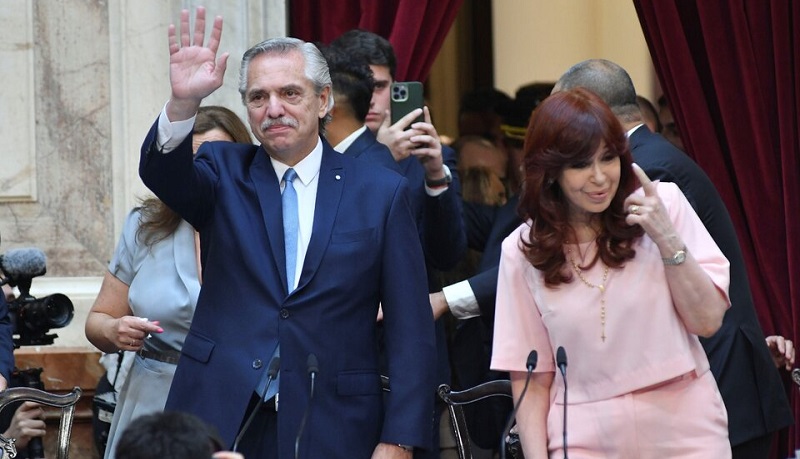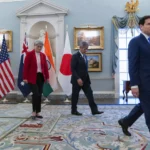
The half truths in the President’s speech and why he considers that he still has electoral competitiveness. Editorial of “El Círculo Rojo”, a program from La Izquierda Diario that is broadcast on Thursdays from 10 pm to 12 midnight on Radio Con Vos, 89.9.
- Finally came the day in which Alberto Fernandez provided the last speech of opening of sessions ordinary of Congress. the last of on mandate and maybe your career as president of the Nation —about that still the last word has not been said—.
- I’m going to expand some reflections contained in a short article what i posted today elDiarioAr as a First comment about the President’s speech and its repercussions.
- synthesized two definitions or two ideas: on the one hand that he long story of the President highlighted macroeconomic numbers without saying anything or saying bit about him other side from those big numbers. I mean, she talked about growth of the economy without showing or without accentuating who they are beneficiaries of that growth:
- For example, the share of the wage bill in the income it is still under of the one in force at the end of the management of Let’s change (43.6% vs 45.7%) and the wages of the formal workers accumulated a 23.2% loss in its purchasing power in between 2015 y 2022, a part during the management of the Frente de Todos. The same thing happened with the AUH and the retirements.
- This is also the counteract of the industrial growth or of agribusinesswhich were detached by Alberto Fernandez.
- The same goes for him job growth: the President said that “formal employment has grown by 4.1% since December 2019” and may be truebut today one much of the formal employment it is also precarious. The precariousness of work or what some authors call the latin americanization of the “labor market” leads to a unprecedented phenomenon in Argentina: one low unemploymentbut what does not manifest in a real wage increase and a consequent poverty reduction Because? Because the effect what before was essentially generated by direct unemployment (the market pressure working for contain wagesthe famous “industrial reserve army”) today is produced in part by the precariousness who exerts a similar effect.
- In this framework, it seems that there is an Argentine what march to of the speedsHowever, the unified inflation somehow all because sink the poorest and push a consumption frenzy to ese diffuse universe included within the “middle class”. Recent data: The IPC Ecolatina for him Greater Buenos Aires climbed 6.6% monthly in February (+105.5% yoy), consolidating the rebound registered in January and accumulating in the year an increase of 13.4%.
- The fascination that generates Alberto Fernández that part of the country what does it look like more dynamism leads him to furcios a bit muggy like the one he declared on Monday in Chaco when he said that the great teachers drama is the one of income tax. Just in the week that there was paro in 14 provinces.
- Not to mention if we get into others structural issuesbut almost absent in speech as housing crisis (He talked about the delivery of some homes), but anything of the killer rentals and in general the lack of access to one own house. Or of hungerdo you remember the table against hunger in which i was until Marcelo Tinelli? Good: who they can’t cover their basic needs they went from being the 28,6 % of the population in 2017 al 36,5 % in 2022. Those who could not even access a minimum feed they passed in turn from 6,2 % al 8,8 %.
- There is a social reality what it was not narrated in it Wonderland that Fernández spoke of and this leads to the second aspect of which he spoke in the note of elDiarioAr.
- If this is reality, how can it be that with these results that demonstrate the breach of practically all the promises of the electoral contractthe President has or believes he has electoral competitiveness o political weight in peronism?
- Reading the book by Mariana Gene and Gabriel Vommaro “The intact dream of the center-right” one has the feeling of a déjà vú: lousy economic and social results y electoral competitiveness they also marked the end of Macri.
- And what happens is that the freak expresses itself for the refusal: the leadership crisis of the Frente de Todos (with the decline of Cristina Kirchner) and also from the opposition lead Alberto Fernández to believe that even he has chances. and that leadership crisis essentially has nothing to do with personasbut with the political projects that at least in the last decade accentuated the country’s chronic crisis.
- In that context, as the IMF imposes a plan what makes nobody it can differentiate a lot in the economic terrainor rather in a “asymmetric polarization”the right he says he’s going to do faster what the government does gradually; then you look for one Polarization in the policy against Supreme Court (which also has a very large discredit and are functional to the opposition).
- Alberto Fernández bet on polarize with the judiciary and through him with the opposition —y to block all the factions of the Front of All in the political arena—because he cannot (or rather does not want to) polarize in the economy.
- Also in the Macri years there was talk of the “disconnect” that macrismo (and especially Marcos Pena) believed that they had achieved between the economy and the policy (or in a broader sense in his “culture battle”). They said: it is true that we are adjusting, but people support us just the same because they want a change. Well, that’s how it went.
- The prediction is difficult -said someone out there- much more when it comes to the future. We can add that it is more difficult in a panorama marked by a multiple crisis. However, what we can say is that the economy determines “ultimately”but when it determines it does without contemplation. It worked for Macri, it works for Alberto and for everyone else too.
Photo: NA
Politics / Adjustment / Alberto Fernández / Opening of legislative sessions / The Red Circle
Source: www.laizquierdadiario.com

